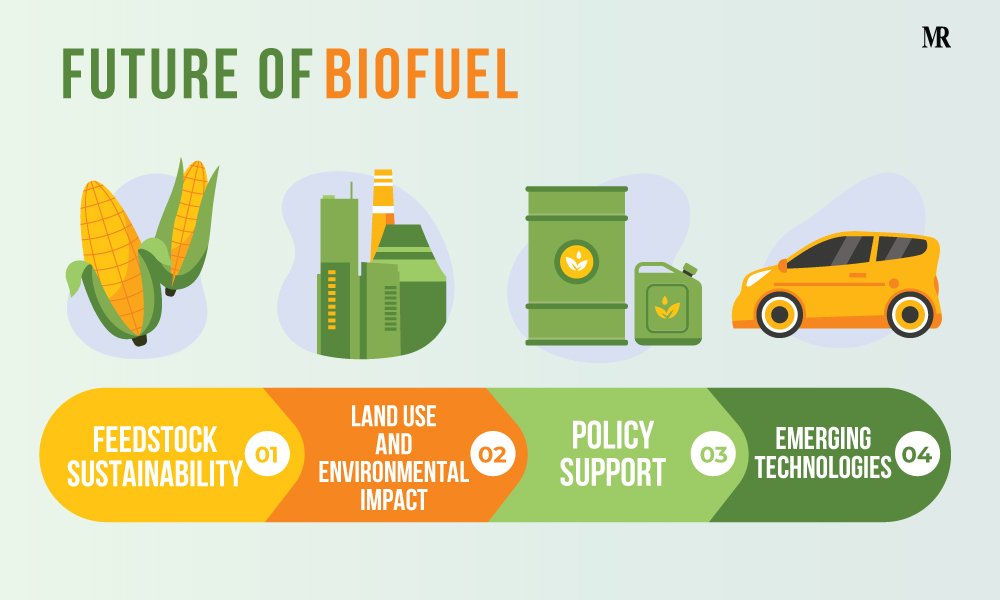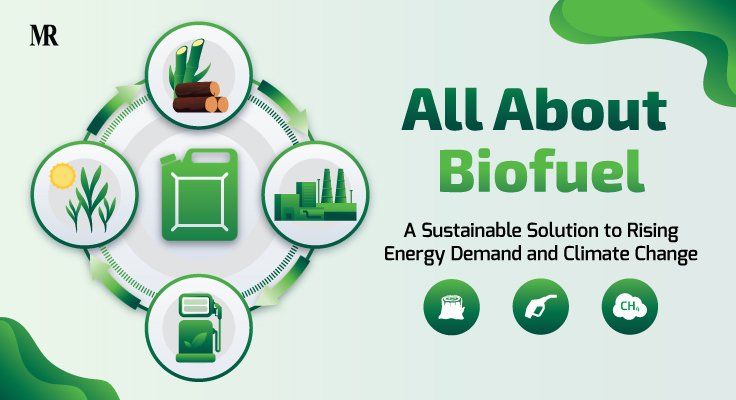Biofuel presents a promising solution for renewable energy. It comes from biomass, which is organic matter that can be quickly replaced. This kind of sustainable energy offers a green option instead of the usual fossil fuels, helping fight climate change and cut down on greenhouse gases.
The sources of biomass are many. They range from crops like corn and sugarcane to non-food sources like algae and leftover wood from forests. Even waste from animals and garbage from towns can be used to make biofuel. This makes biofuel a flexible and effective way to create energy. Moreover, biofuels have many uses. They can power different parts of our lives while causing less harm to the environment. They can be turned into bioethanol and biodiesel for transportation, taking the place of fuels made from petroleum.
Biofuel Industry at a Glance
The global biofuel market is experiencing significant growth, poised to reach a substantial value of $124 billion in 2023, up from $115 billion in 2022. An increase in biofuel production parallels this expansion, projected to reach 190 billion liters in 2023, compared to 180 billion liters in 2022. As demand continues to rise, global biofuel consumption is also expected to grow, with an estimated 185 billion liters in 2023. The United States takes the lead as the largest producer of biofuels, contributing over 30% to global production in 2023. Following closely behind is Brazil, and then Indonesia, the European Union, and China.
Among the various forms of biofuels, liquid biofuels hold the largest market share, accounting for 43.91% of the revenue in 2022. This growth is due to the increasing emphasis on energy security and using liquid biofuels in flexible-fuel vehicles. Moreover, various countries’ mandates for bioethanol blending have further propelled the utilization of liquid biofuels.
Types of Biofuels
Biofuels are renewable and environmentally friendly alternatives to conventional fossil fuels, and they come in these types:
- Ethanol
Ethanol, a type of alcohol-based biofuel, mainly comes from crops like corn, sugarcane, and wheat. It is often mixed with gasoline to make blends like E10 (10% ethanol and 90% gasoline) or E85 (85% ethanol and 15% gasoline). Moreover, it is a popular biofuel for transportation and is thought to be a cleaner fuel. India is actively pursuing the Ethanol Blended Petrol (EBP) Program. The goal is to blend 20% ethanol into petrol by 2025.
- Biodiesel
Biodiesel, a renewable diesel fuel, is created from vegetable oils, animal fats, or recycled cooking oil. It can replace or be mixed with petroleum diesel in various ratios (like B5, B20, etc.). Biodiesel shares similar properties with petroleum diesel and can run in regular diesel engines without alterations. Notably, it emits fewer greenhouse gases and reduced exhaust pollutants compared to traditional diesel.
- Biogas
Biogas, a gaseous biofuel, forms from the anaerobic digestion of organic matter, including food waste, agricultural residues, and sewage sludge. Its main components are methane (CH4) and carbon dioxide (CO2). It serves purposes like generating electricity, heating, and fueling transportation. Additionally, the production of biogas contributes to waste management by converting organic waste into a valuable energy source.
Benefits to look for

Biofuels offer a range of advantages that make them an attractive alternative to traditional fossil fuels. Some of the critical benefits of biofuels include:
- Renewable
Biofuels are derived from organic materials such as crops, plants, algae, and waste, which can be grown, harvested, and regenerated relatively quickly. Unlike finite fossil fuels, which take millions of years to form, biofuels are considered renewable energy sources. This renewable nature ensures a continuous and sustainable fuel supply, reducing our dependence on depleting fossil fuel reserves.
- Environmentally Friendly
One of the most significant advantages of biofuels is their potential to reduce greenhouse gas emissions and combat climate change. When burned, biofuels release carbon dioxide (CO2) into the atmosphere, but the CO2 released is equivalent to the amount the plants absorbed during their growth phase. As a result, the net carbon emissions from biofuels are much lower than those from fossil fuels, making them a cleaner and greener energy option.
- Cost-Effective
Local production of biofuels reduces the need for expensive imports of fossil fuels. In certain areas, making biofuels can give farmers and rural communities chances to earn money. This happens because new markets for farm goods and waste are created. Moreover, as technology gets better and more biofuel is made, the cost of biofuels is predicted to become more and more competitive with regular fuels.
Challenges on the way
While biofuels offer numerous advantages, they also come with certain disadvantages and challenges:
- Land Use
Biofuels raise a major worry related to land use. When biofuel crops are grown on a big scale, they need a lot of land. This can cause deforestation and change natural homes into farmland. Changing land like this can mean that various kinds of plants and animals disappear, and ecosystems get messed up. This can be a real problem for the environment.
- Food vs. Fuel
The “food vs. fuel” debate is a critical ethical and social issue associated with biofuels. A possible conflict with food production exists when more land is committed to biofuel crop cultivation. The competition for agricultural resources can drive up food prices and exacerbate food insecurity, particularly in developing countries where food crops are a primary source of sustenance.
- Infrastructure
Using biofuels on a large scale might mean big changes to the current setup. Various kinds of biofuels might have to travel through different systems for distribution. Also, engines and vehicles could need changes to work well with these new fuels. But building the needed systems can take a lot of money and time. This can be a hurdle to quickly adopting biofuels as a real option instead of the usual fossil fuels.
Top Biofuel-Producing Countries

- United States: Corn is the major source of ethanol in the US. The United States is the world’s leading ethanol producer, with a production capacity of 15 billion gallons per year.
- Brazil: Brazil is the world’s leading biodiesel producer, with a production capacity of 5.5 billion gallons per year. Soybeans are the primary source of biodiesel production in Brazil.
- Indonesia: Indonesia follows the process of decomposing organic waste at large scale. It is the world’s leading producer of biogas, with a production capacity of 1.5 billion cubic meters per year.
- Germany: Germany produces advance biofuels from non-feedstocks, such as algae and waste biomass. It is the world’s leading producer of advanced biofuels, with a production capacity of 1.2 billion gallons per year.
- Argentina: Argentina is a significant producer of biodiesel and bioethanol. The country has a production capacity of 2.5 billion gallons of biodiesel and 1.5 billion gallons of bioethanol per year.
Economic Angle of Biofuel
The economic angle of biofuels presents several compelling advantages:
- Job Creation
The biofuel industry significantly impacts employment, generating job opportunities across various sectors. From farmers growing biofuel crops to technicians working in biofuel production facilities and researchers developing advanced biofuel technologies to truck drivers transporting biofuels, the industry creates a diverse range of jobs, both directly and indirectly.
- Economic Diversification
Biofuels introduce new markets and industries, diversifying the economy beyond traditional fossil fuel-based sectors. Thus, it stimulates research, infrastructure, and technology investments, fostering innovation and promoting growth in related sectors.
- Increased Tax Revenue
Biofuel production and consumption contribute to government tax revenues. Taxes levied on biofuel production, sales, and distribution channels generate additional income for governments, which can then fund public services, infrastructure projects, and social welfare initiatives.
- Economic Stability
Reducing reliance on imported oil through the increased use of domestically produced biofuels enhances economic stability. Therefore, countries can achieve a more secure and predictable energy landscape by minimizing exposure to fluctuations in global oil prices and geopolitical tensions.
Specific examples from various countries demonstrate the substantial economic impact of biofuels:
- The biofuel industry sustains over 300,000 jobs in the United States, supporting employment in rural areas and contributing to economic growth.
- In Brazil, where most biofuels are made from sugarcane ethanol, the biofuel business accounts for over 4% of GDP and has a substantial economic impact on the nation.
- The enormous tax revenue from the biofuel industry in the European Union, which exceeds $10 billion annually, aids in funding public services and several government programmes.
- In Indonesia, the biofuel sector has been crucial in lowering the nation’s reliance on oil imports by more than 50%, enhancing energy security, and boosting the economy.
Future of Biofuel

Indeed, the future of biofuels presents both opportunities and challenges. Biofuels have the potential to play a crucial role in achieving sustainable energy goals and mitigating climate change. However, several factors need to be addressed for their widespread adoption and success as a significant energy source. Some key aspects to consider are:
- Feedstock Sustainability: Ensuring a sustainable and diverse feedstock supply for biofuel production is essential. Hence, balancing the demand for biofuel crops with food production and conservation efforts is crucial to avoid negative environmental and social impacts.
- Land Use and Environmental Impact: Proper land use planning and environmental impact assessments are vital to prevent deforestation, habitat loss, and other negative consequences of large-scale biofuel crop cultivation.
- Policy Support: Government policies and regulations can significantly influence the growth of the biofuel industry. Supportive policies, such as incentives, mandates, and research funding, can accelerate the adoption.
- Emerging Technologies: Advancements in algae-based biofuels and synthetic biology promise to overcome some of the challenges traditional biofuel production methods face.
Despite these challenges, the potential benefits of biofuels are significant. They offer a renewable and low-carbon alternative to fossil fuels, reducing greenhouse gas emissions and contributing to energy security. Biofuels also have the potential to revitalize rural economies and create job opportunities in various sectors.
Conclusion
While the world keeps working on dealing with climate change and moving towards energy that’s better for the environment, biofuel will probably have a place in the mix of different kinds of renewable energy. To really make biofuels work well and have a big impact, more research, money, and dedication from governments, industries, and people are needed. This will help us get the most out of biofuels and use them effectively in the world’s energy picture.
Keep Reading! Keep Growing!












